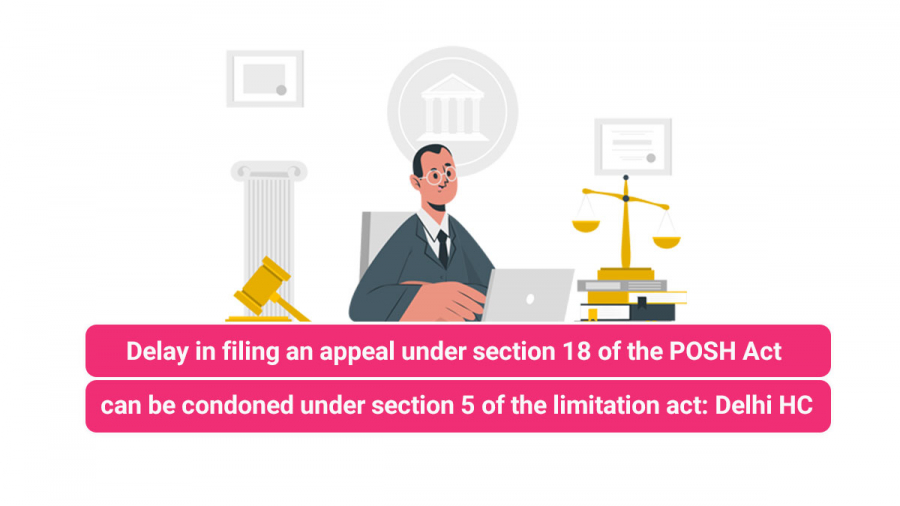In the case of DB Corp. Ltd. vs. X and Ors., (MANU/DE/2590/2022), the Delhi High Court considered the question of whether Section 5 of the Limitation Act, 1963, would apply to appeals under Section 18 of the Sexual Harassment of Women at Workplace (Prevention, Prohibition and Redressal) Act, 2013 (“the POSH Act”). Holding in the affirmative, the Delhi High Court stated that delay under the POSH Law can be condoned as per the Limitation Act.
FACTS OF THE CASE: Respondent 1 (original complainant) alleged that she was sexually harassed at her workplace/organization (Petitioner). The complaint was referred to the internal committee (IC) of the Petitioner which, vide inquiry acquitted Respondent 2. Hence an appeal was filed under Section 18 of the POSH Act, to the Central Government Industrial Tribunal (“IT”). The impugned order, passed by IT condones the delay of 36 days to prefer the appeal.
Aggrieved by the said order, the Petitioner company challenged the same invoking Article 227 of the Constitution of India. The issue in controversy in the present case was whether the IT could have condoned the delay in filing the appeal under Section 18 of the POSH Act.
CONTENTIONS OF PETITIONER: The contentions of the petitioner were that no provision for condonation of delay is to be found in Section 18 of the POSH Act, and as Section 18(2) uses the word “shall”, the IT could not have condoned the delay in filing of appeal by the respondent.
The petitioner company relied on the decision of the Supreme Court in Commissioner of Customs & Central Excise v. Hongo India Pvt. Ltd where the Apex Court had observed that, “………..In other words, the language used in other provisions makes the position clear that the legislature intended the appellate authority to entertain the appeal by condoning the delay only up to 30 days after the expiry of 60 days which is the preliminary limitation period for preferring an appeal. In the absence of any clause condoning the delay by showing sufficient cause after the prescribed period, there is complete exclusion of Section 5 of the Limitation Act. The High Court was, therefore, justified in holding that there was no power to condone the delay after expiry of the prescribed period of 180 days.”
COURT OBSERVATIONS: The Court emphasized that the POSH Act is an ameliorative statute, intended to redress a serious social evil. It cannot be denied that victims of sexual harassment at the workplace suffer untold trauma, mental, physical, and spiritual.
The Court heard the petitioner and made the following observations:
1) It is clear that Section 18(2) of the POSH Act proposes a period of limitation, for filing an appeal under Section 18(1), not to be found in the Limitation Act. Equally, it is clear that no express or implied exclusion of the Limitation Act, and its provisions, is to be found anywhere in the POSH Act. The Court while comparing the Central Excise Act stated that the POSH Act does not have a specific provision for condonation of delay.
2) The Court thus agreed with the observations made by the Industrial Tribunal that a victim of sexual harassment remains in a state of trauma, and it cannot be expected that she would immediately rush to a Court seeking appellate remedies.
The Court also added “Having said that, it is clarified that these observations are only intended to justify the power of condonation of delay, which the IT has exercised. They do not, in any manner, amount to an expression of opinion, one way or the other, on the allegations of sexual harassment forming the subject matter of proceedings in the present case. They should not, therefore, influence IT in taking a dispassionate view on the appeal filed by the respondent.”
– Deeksha Rai, Deeksha Rai, Litigation – Associate, Equilibrio Advisory LLP
 Cart is empty
Cart is empty



